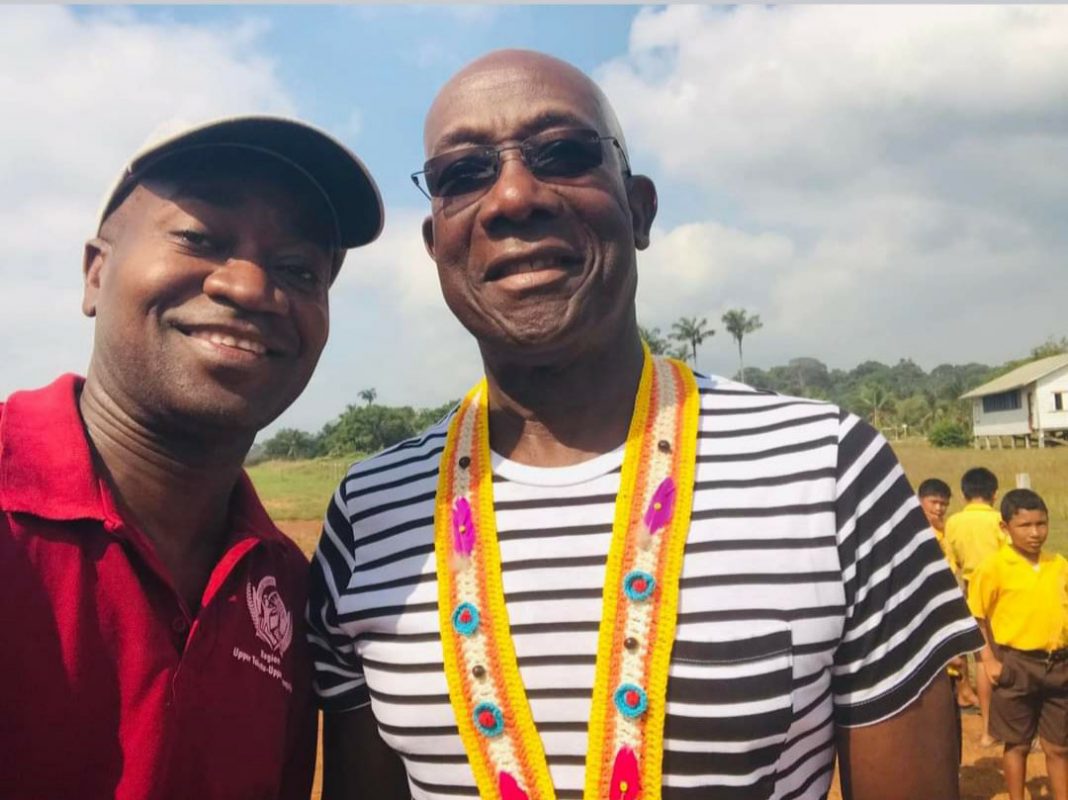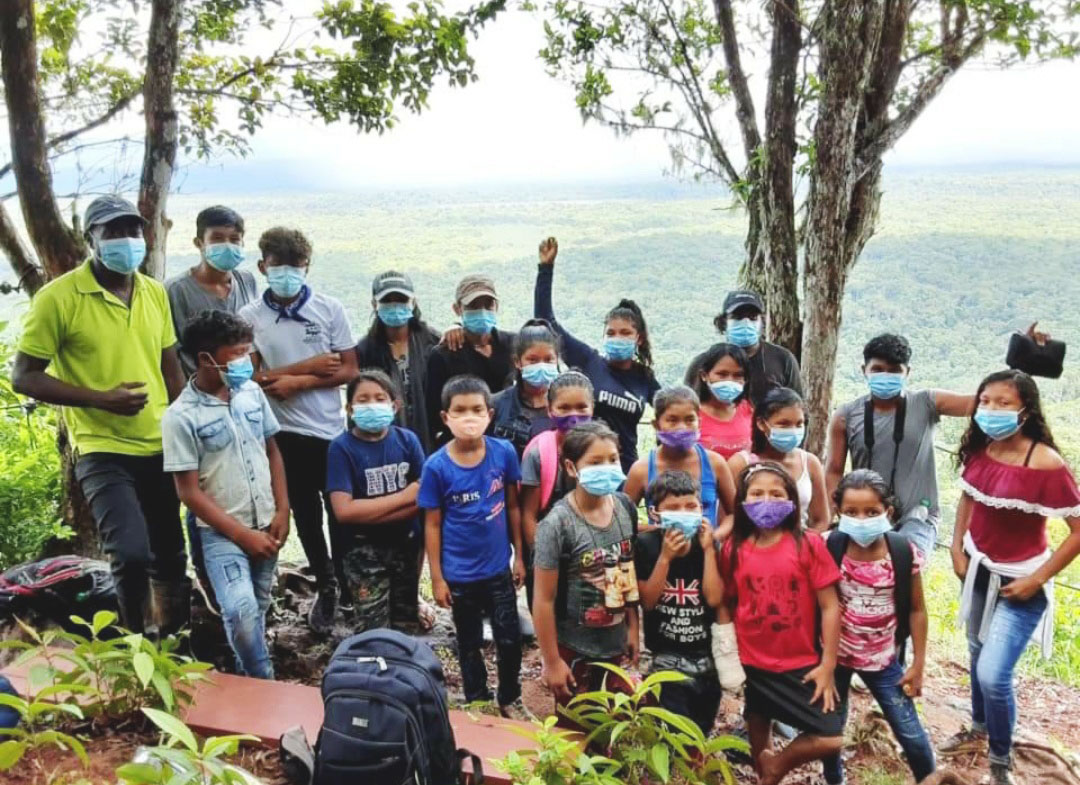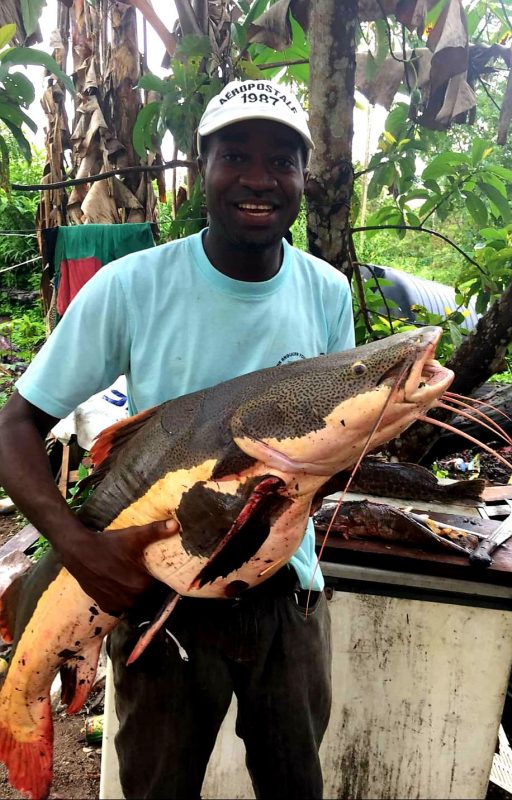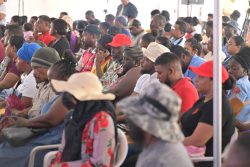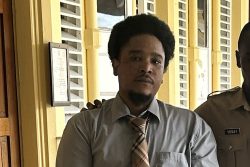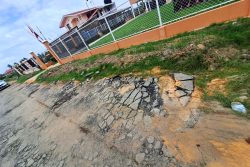By Miranda La Rose
Just over six years ago, Headmaster Quado Vancooten moved to Kurupukari Primary in Fairview Village, Region Eight (Potaro-Siparuni) after learning of a grave teacher shortage at that school. At that point, he had been teaching in Region Two (Pomeroon-Supenaam) and in Georgetown for 22 years. Kurupukari Primary is the only school in Fairview Village, the lone community in the Iwokrama rainforest reserve.
In 2016, during the August holidays, Vancooten, then headmaster of Mashabo Primary in Region Two accompanied a group of Trinidadians to Lethem to give out some school supplies. At Kurupukari Crossing they asked a woman operating a snackette if there were any schools in the area. She told them about Kurupukari Primary adding that it was being run by two teachers, one for primary and one for nursery.
“She said the children weren’t learning much. I couldn’t get what she said off my mind. At the time Mashabo Primary, where I spent 13 years, was getting trained teachers. The teachers were not leaving as before and the school was doing very pretty well. I said to myself, ‘If I leave the school it would be in good hands,’” Vancooten told Stabroek Weekend in a recent interview.
Apart from wanting to help with the teachers’ shortage at Kurupukari Primary, Vancooten had become fascinated with the Rupununi and wanted the experience of working in the area. He had been there before, having visited Annai Primary School in 2015.
In April 2017, Vancooten applied for a transfer to Kurupukari Primary and was successful. In December 2017 he moved to Fairview Village.
“When I arrived two teachers were in the primary and one in the nursery,” he recalled. They do multi-grade teaching in the school which has a steady enrolment of about 100.
“Fairview was another good experience in my teaching career. It is a matter of adapting to the environment… and establishing working relationships with parents and the community. Once that relationship is established the challenges are reduced. Here in Fairview, parents are supportive. We give free extra lessons and now we incorporate technology. We try to upgrade and move with the times,” he said.
Vancooten said he also has, “good luck or something good with accommodation.”
When he arrived in Fairview, the engineer for Region Eight and a crew were checking all the government buildings in the area. Another teacher occupied the duplex apartment building. After assessing the state of the building, they went away, then returned and completed general repairs. At the same time, they constructed the hot meals building for the school.
“When they completed the repairs to the duplex apartment everything was as good as new. The same thing happened to me at Mashabo where the head teachers’ building was renovated. In Mainstay, the hut where I lived was renovated. This building in Fairview is the most comfortable of the teachers’ quarters I have lived in. The primary school building was repainted and tiled,” he said
When he arrived at Kurupukari Primary, the school operated a primary top. A year later it was closed and the students, after completing Grade Six, were sent to Annai Secondary School 63 miles away, where they live in dorms. Fairview Village has 59 children at Annai Secondary from grades seven to eleven. Once they finish primary school the children are automatically placed at Annai Secondary. However, some students earn places at St Ignatius Secondary in Lethem. In some cases, where children placed at Annai Secondary have obtained marks that would enable them to enter St Ignatius Secondary, transfers are sought for them, if they so desire.
Himself included, Vancooten now has seven teachers at Kurupukari Primary. “I have students who finish high school. I encourage them to apply to teach at Kurukupari Primary. So that is how we got a few teachers from Fairview. I also encourage them to become trained. Out of the seven now at the school two are in the CPCE associate degree programme. Four are in the CPCE upgrading programme of which I am the tutor here. The two in the associate programme travel to Annai for tutoring.
Community relations
The school has a strong relationship with Iwokrama International Centre for Rainforest Conservation and Development.
“Fairview Village is the only community in the national protected area. The centre keeps abreast of what we do in the school. Our school children are part of the Fairview Wildlife Club and Iwokrama rangers work directly with us. They teach our children how to protect the environment. We have a birdwatching club that Iwokrama recently launched. When visitors come to the area for birdwatching, our children sometimes join them in their nature walks to observe the different species of birds. The older children also chip in as guides as they are familiar with the different species of birds,” he related
Three languages – Macushi, Patamona and Wapichan – are spoken in the village.
The village is Makushi in origin but some families migrated to Fairview from the North Rupununi where the Patamona language is spoken and some migrated from South Rupununi where they speak Wapichan. English is the common language.
“I encourage the elders to teach the younger school children to speak their language alongside the English language. I am learning both Patamona and Macushi. We can’t be living in an area and we can’t communicate with people in their language. An elder teaches us Macushi and the health worker teaches us Patamona. A lot of the older folks did not get a formal education and do not know how to read or write. We have thrown out the idea of teaching them those skills. If they are willing to teach us their language, we have to give back in some way,” he said.
Formal teaching began in Fairview in 1997.
The only regret Vancooten has is that he did not complete a bachelor’s degree in education at the University of Guyana. “I still have to complete that programme,” he said. “Most of my CPCE [Cyril Potter College of Education] batch mates have completed it.”
Farine is the staple meal and Vancooten said he “has fallen in love” with it. I have become a farine eater.” He makes several dishes with it.
“Fairview is also the freshwater fish capital of Guyana,” he contended. “We cook a lot of fish in the school’s hot meals programme because it is readily available. Among the fish found in abundance in the area are haimara, lukanani, freshwater basha and pacu.
Sports
Because of his connections to swimming in Georgetown, Vancooten has been Region Nine swim team’s coach for the past four inter-schools’ championships.
“We have a pool in Masara so we train them there in the different techniques. I coach at the branch level. We also bring coaches from town before the schools’ nationals. This year is the first time we came fourth and had the most medals in swimming at nationals. Usually Regions One and Two from among the hinterland regions would do better than us,” he said.
Through sports he has travelled to several places including Moco Moco, Sand Creek and Karaudarnau for inter-branch meets.
“Over the last four years whenever we go to town we link up with businessman Mr Roy Beepat who treats the children to a movie and other goodies,” he revealed.
Last year Region Nine won the overall cycling title at the schools’ national athletic championships. Vancooten had assisted in seeking sponsorship for the cyclists from Chief Executive Officer of Impressions Patrick Neal Suklal.
“We got over 17 medals including 14 golds in cycling. Mr Neal was impressed with the team. He did all the banners. He invited the team to his office and did a presentation for them,” he said
While Kurupukari Primary falls geographically in Region Eight, for educational purposes it is administered under Region Nine education department because it is closer to and easier to manage logistically from Lethem.
“Our school is ideally located… We are happy that the students get exposure to sustainable tourism, sustainable development and protection of the environment through Iwokrama. The environment allows us to do a lot of practical teaching. For science we sometimes go outdoors, like to Iwokrama River Lodge or to Kurupukari Crossing,” he said. “Kurupukari Crossing will be bridged sooner or later. When that is done, time consumed in travelling will be reduced a great deal.”
Compared to when he first went to Fairview, Vancooten said, the time to travel in and out of the area to Linden and Georgetown has reduced significantly especially during the rainy seasons.
“The first time during the rainy season it took us about 14 to 15 hours from Kurupukari to Georgetown. But now even with rains we take about five to six hours to get to Linden from Kurupukari Crossing and between seven to eight hours to get to Georgetown depending on the traffic,” he said.
Finding a career
Vancooten was born in La Grange, West Bank Demerara, but grew up in Vryheid’s Lust, East Coast Demerara, He got into teaching at the suggestion of an aunt because he did not know what he wanted to do after he graduated from Cummings Lodge Secondary School. “Me and most of my classmates from that batch limed for that year after leaving high school,” he added ruefully.
His aunt, who was an education officer stationed in Region Three (West Demerara-Essequibo Islands) said he couldn’t continue liming. “She suggested I get into teaching, so I gave it a try,” he said. That was 1993.
Vancooten taught for a year as an unqualified teacher at FE Pollard Primary in Georgetown. After that year he was not certain he wanted to stay in teaching so he left. However, he returned to teaching in 1994 at St Margaret’s Primary where he became serious about it and taught there for three years. In 1997, he entered CPCE and completed the two-year primary education programme.
“We were the last batch of students to wear the brown and white uniforms [at CPCE],” he said.
At CPCE he met student teachers from the hinterland and wanted to experience the challenges of working in the hinterland regions. In September 1999, he joined the staff at Lake Mainstay Primary School where he taught for five years. Mainstay was a rewarding experience for him.
“I was 23 years old at the time. There I gained a wealth of experience in personal and professional development. Apart from further developing my teaching and managerial skills, I learned to swim, to cook and to do everything for myself,” he said He also had an insight into the then fledgling tourism industry. Lake Mainstay Resort opened the year he got there. Every weekend he witnessed batches of visitors going to the resort.
“The opening of the resort brought with it a number of benefits to the community and by extension the school. The area got electricity and lots of donors came on board to assist the primary school. There was a little army’s hut that they gave to the education department. The department repaired it for me and I was the first teacher to stay in it,” he recalled.
After deputising occasionally or acting in the stead of the headmaster at Lake Mainstay Primary, in 2004 the school’s headmaster encouraged Vancooten to seek a head teachers position at another school.
“I was 28 years going on 29. I thought I wasn’t going to make it because most of the headteachers at the time were in their late 30s or early 40s. There was a vacancy for a headteacher at Mashabo Primary School. I applied. They promoted me on my first try without a bachelor’s degree,” he said.
He got married at 29 and has a daughter and a son. “There I was in Mashabo raising my family as well,” he noted. His daughter is now a second-year student at UG and his son is enjoying a stint at Bina Hill Institute in Annai.
He stayed at Mashabo Primary from 2004 to 2017, the longest period he has stayed at any school. He felt Mashabo was “awesome” in spite of its advantages and disadvantages. Like many hinterland communities at the time, it had no electricity. The main challenges he had to deal with on arrival at Mashabo were the large turnover of teachers and the dropout rate of Mashabo children who were placed at Aurora Secondary School.
“When I got there, the primary top of Mashabo Primary was closed down and the students were sent to Aurora Secondary in Aurora Village. In Aurora Village, there was no proper accommodation for the children and they had to travel every day from Mashabo to Aurora,” he related.
“Many students dropped out by the time they reached fourth form. Students had to catch a boat to cross about four miles of Mashabo Lake. At the ‘lake top’ they had to take a car to the Essequibo Coast Public Road where they either took a taxi or a minibus to get to the school about five miles away. They had to do the reverse to return home every school day. That was a lot of travelling for them.”
With representation from all involved, a new school was built to house Aurora Secondary at Pomona which is closer to Mashabo and dormitories were added to accommodate students from outlying areas including Mashabo. Aurora Secondary previously shared the Aurora Primary School building. With the new facilities at Aurora Secondary students from Mashabo started completing their secondary education and went on to further their studies.
“When I got to Mashabo just a handful of students completed secondary school. I didn’t teach that batch that persevered but they have done great things for themselves. Now there is a change in the trajectory and quite a number of those who lived in the dorms are working in the public and private sectors. I am happy to have made my contribution there,” he said.



